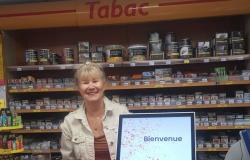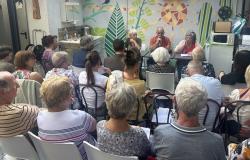So as not to miss the final of Koh Lanta with her two boys, she does not hesitate to make a Dinard-Paris round trip during the day especially to La Tribune Sunday. Meet at the Le Littré hotel, not far from Montparnasse train station. She arrives in the hall incognito in jeans and sneakers. With ten books in ten years, Aurélie Valognes is one of the most read novelists in France with 5 million copies sold. A daydream for this daughter of a childminder and worker who grew up in a public housing project. And despite her environment not conducive to ambition, the forty-something always knew that her insatiable curiosity would carry her into a prodigious life. A class exile who has finally managed to find her place.
Nikos Aliagas: “Photography was like therapy”
LA TRIBUNE SUNDAY – Is writing your biggest addiction?
AURELIE VALOGNES – Absolutely. This is the moment when I feel like me. The moment when I really feel like I belong. And useful.
Because you don’t belong elsewhere?
I’ve always been a bit of an anomaly in my family. One might well ask why my mother and father are my parents. I am the only one in the family to have studied extensively, to have lived abroad, to feel this infinite desire to constantly learn, to confront myself in order to grow and try to be every day a best person. It’s my engine. But I’m lucky: curiosity is a wonderful birth gift.
Did you also feel like the “anomaly” at school?
As a child, I didn’t ask myself all these questions. I probably had other questions, and a lot of them. I was a very natural little girl, a little irreverent but also a very good student. I experienced childhood as torture because I wanted to direct my own life. We live in a world that teaches us from a young age not to say what we think. Especially among little girls. We women grow up with the idea that if we say what we think, we risk not being loved. So much self-sacrifice, perfection, and on all fronts are expected of us. I tried but I quickly understood that I wouldn’t succeed, that it wasn’t for me. I am not the perfect mother or wife. Neither a housewife nor a house fairy. You shouldn’t expect that from me. It’s not for nothing that we start writing. We write because we cannot say. So when it explodes in me, I grab my pencil and a piece of paper. Writing heals me.
Have you always feared not being loved for who you are?
I’m just starting to accept being myself. When I can be 100% natural, I’m a good person. On the other hand, it’s not easy every day for those around me because I defend my freedom. Gisèle Halimi said that to be a free woman you have to be selfish. She’s right, and yet I don’t like this word: a man who does what he wants is “free”, but a woman would be “selfish”? I’m already trying to put myself back at the center of my own life, then come my children and my husband. It’s like the story of the oxygen mask on airplanes. I can’t help others if I’m in pain. Self-denial plunged me into burnouts and baby blues.
You have sold more than 5 million books. Are you really aware
of your success?
I see clearly that when I open the mailbox or hand over my bank card I am no longer afraid.
Do you feel guilty for being so happy?
I keep a low profile. Like any class defector, I know where I come from. I lead a privileged life, I live in a town that I chose, in Dinard in Brittany, not far from François Pinault. My daily life is much easier than that of my childhood, and yet I don’t think I have changed. On the contrary.
Why did you wait thirty years to become a writer?
It was a little girl’s dream, but I had put it aside. Everything I learned was through school, and there was no school to become a writer, so I did other studies. And then it couldn’t be for me: the real writers, those I studied at school, were men, well born, cultured. The word “writer” didn’t even exist, no wonder we felt illegitimate. When my husband was transferred to Milan, I had to resign from my job in marketing. I registered at the French Institute, and when I was asked my profession, it was unthinkable to answer “unemployed” Or ” housewife “. So I said “writer”. From that moment on, there was no turning back. It was now or never. Life can end overnight, even when young. At the same time, my closest cousin was battling breast cancer and it haunted me. Every night, I dreamed of my grave, on which “Aurélie Valognes, writer” was engraved.
Do you feel contempt in the German-speaking world?
Not from my fellow writers. On the contrary, with them, I feel a lot of goodwill. With some journalists, maybe… But I’m going to be very honest with you. I can put myself in their place. I knew nothing about this literary world, the codes, what was being done or not. I self-published my first book, Grandma in the nettles, from Milan, I chose a gingham cover because it reminded me of my grandfather’s napkins, and as it seemed to work, I continued to use French expressions for the titles of my books. Then, it’s true that when I discovered that there was a conference at the Sorbonne on “feel good” novels, including mine, it was a shock. Especially the meeting with two university professors who had read everything about me and in particular Flight, the first in which I took the “I”. They gave me the most beautiful gift, the one I was waiting for without knowing it, which could only come from school, when they said to me: “It’s beautiful to witness the birth of a writer. » It gives all the strength in the world, and also the freedom to continue, and to finally feel legitimate.
What’s Aurélie Valognes’ Sunday like?
I hate Sunday because it’s a day when I don’t work. Even when I was little, I was depressed because I couldn’t go to school. I’m quite sunny by nature, but if there’s nothing to get me out of bed I can really let myself waste away. Fortunately, the birds that sing, the books I want to read and my golden retriever are good reasons to get up on Sunday morning.
La Lignée, Fayard, 360 pages, 21.90 euros.
His favorites
She likes to take her mother, Corinne, to dinner at Petit Bleu. “A very
wanted held by a couple and with a beautiful selection in the cellar. » If she is more of a fan of Patti Smith, the voice of the young singer Pomme may give her some chills. Other thrills, but for the eyes: the essay by Carol Gilligan A voice
human.
* Le Petit Bleu, 31, rue de la Vallée, Dinard (Ille-et-Vilaine).






